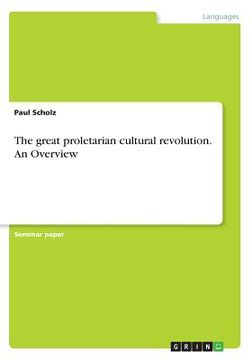Share
The great proletarian cultural revolution. An Overview
Paul Scholz
(Author)
·
Grin Verlag
· Paperback
The great proletarian cultural revolution. An Overview - Scholz, Paul
Choose the list to add your product or create one New List
✓ Product added successfully to the Wishlist.
Go to My Wishlists
Origin: U.S.A.
(Import costs included in the price)
It will be shipped from our warehouse between
Monday, June 17 and
Wednesday, July 03.
You will receive it anywhere in United Kingdom between 1 and 3 business days after shipment.
Synopsis "The great proletarian cultural revolution. An Overview"
Seminar paper from the year 2016 in the subject Orientalism / Sinology - Chinese / China, grade: 1,3, Tsinghua University, language: English, abstract: The Chinese Cultural Revolution, also well known as the Great Proletarian Cultural Revolution - Wuchanjieji Wenhua Dageming, describes a unparalleled and from the top established revolution launched by Chinese Communist Party (CCP) chairman Mao Zedong during his very last period in power (1966-76) to restore the spirit of the Chinese Revolution (Lieberthal 2016). Mao Zedong during this time feared that China possibly could develop like the Soviet Russian nation did and he did not want China to follow their example. He was very concerned about China's and his own place in history and therefore did not hesitate to throw China's cities into chaos in a big effort to reverse the historic processes which were on their way obviously. Plenty of the events during this period of this time are without equal in the modern world's history. After the catastrophic Great Leap Forward, in which according to some sources more than 45 million people died, Mao Zedong decided to take a passive role in governing China. More practical and moderately oriented leaders, such as Vice-Chairman Liu Shaoqi and Premier Zhou Enlai, introduced soft economic reforms founding on individual incentives - such as allowing private people to farm their own land -an effort to rebuild and strengthen the heavily harmed economy (Leese 2016). Mao disliked such actions, as they went against the principles of pure communism in which he believed deeply. In fact, China's economy grew sustainably from 1962 to 1965 with the more conservative economic policies applying (Stanford 2001). [...]
- 0% (0)
- 0% (0)
- 0% (0)
- 0% (0)
- 0% (0)
All books in our catalog are Original.
The book is written in English.
The binding of this edition is Paperback.
✓ Producto agregado correctamente al carro, Ir a Pagar.

